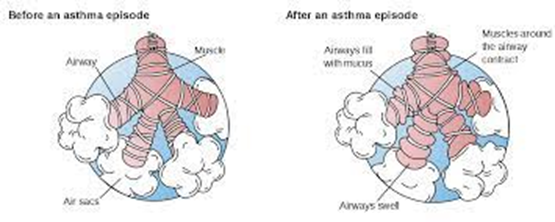A nurse is caring for a client with asthma. Which of the following happens physiologically when bronchospasm occurs?
Decreased mucus production contributes to airway constriction.
Inflammation is reduced due to airway diameter.
Bronchospasm occurs when there is Inflammation, edema, and excess mucus.
Airway obstruction occurs due to thinning mucus.
The Correct Answer is C
Choice A Reason:
Decreased mucus production contributes to airway constriction: This statement is incorrect. Bronchospasm does not decrease mucus production; instead, it primarily affects the smooth muscles surrounding the bronchioles, leading to their constriction and narrowing of the airways. Increased mucus production, often accompanied by inflammation, can contribute to airway obstruction in conditions like asthma.
Choice B Reason:
Inflammation is reduced due to airway diameter: This statement is incorrect. Bronchospasm typically occurs in the setting of inflammation in conditions such as asthma. Constriction of the airways during bronchospasm exacerbates the inflammation and can further narrow the airways, leading to symptoms such as wheezing and dyspnea.
Choice C Reason:
Bronchospasm occurs when there is inflammation, edema, and excess mucus: This statement is partially correct. Bronchospasm often occurs in the presence of inflammation, edema, and excess mucus production, as seen in conditions like asthma. These factors contribute to airway hyperresponsiveness, leading to bronchospasm and airway narrowing.
Choice D Reason:
Airway obstruction occurs due to thinning mucus: This statement is incorrect. Airway obstruction in conditions like asthma is primarily due to bronchospasm, inflammation, and excessive mucus production, rather than thinning mucus. Thinning of mucus would not typically contribute to airway obstruction.

Nursing Test Bank
Naxlex Comprehensive Predictor Exams
Related Questions
Correct Answer is ["A","C","D"]
Explanation
Choice A Reason:
Take small bites of food is correct. Taking small bites of food can help prevent choking and aspiration, particularly during mealtime. It is a recommended practice for individuals with epilepsy to reduce the risk of aspiration if a seizure were to occur during eating.
Choice B Reason:
Liquids should be thickened is incorrect. Thickened liquids are typically recommended for individuals with swallowing difficulties (dysphagia) to help prevent aspiration. However, thickened liquids may not be necessary for all individuals with epilepsy unless specifically indicated based on their swallowing function assessment.
Choice C Reason:
Eat sitting slightly forward correct.: Eating while sitting slightly forward can help prevent aspiration in case of a seizure during meals. This position allows gravity to assist in preventing food or liquid from entering the airway.
Choice D Reason:
Chew food thoroughly before swallowing is correct. Thoroughly chewing food before swallowing is important for proper digestion and to reduce the risk of choking or aspiration, especially for individuals with epilepsy who may be at increased risk of aspiration during a seizure.
Choice E Reason:
Avoid having conversations while eating is incorrect. Avoiding conversations while eating is not directly related to epilepsy management. However, focusing on eating and taking appropriate precautions, such as sitting upright and chewing food thoroughly, can help reduce the risk of aspiration during meals.
Choice F Reason:
Avoid fiber in the diet is incorrect.: There is no specific recommendation to avoid fiber in the diet for individuals with epilepsy. In fact, a balanced diet that includes fiber-rich foods can promote overall health and well-being, which is important for individuals with epilepsy as well.
Correct Answer is C
No explanation
Whether you are a student looking to ace your exams or a practicing nurse seeking to enhance your expertise , our nursing education contents will empower you with the confidence and competence to make a difference in the lives of patients and become a respected leader in the healthcare field.
Visit Naxlex, invest in your future and unlock endless possibilities with our unparalleled nursing education contents today
Report Wrong Answer on the Current Question
Do you disagree with the answer? If yes, what is your expected answer? Explain.
Kindly be descriptive with the issue you are facing.
